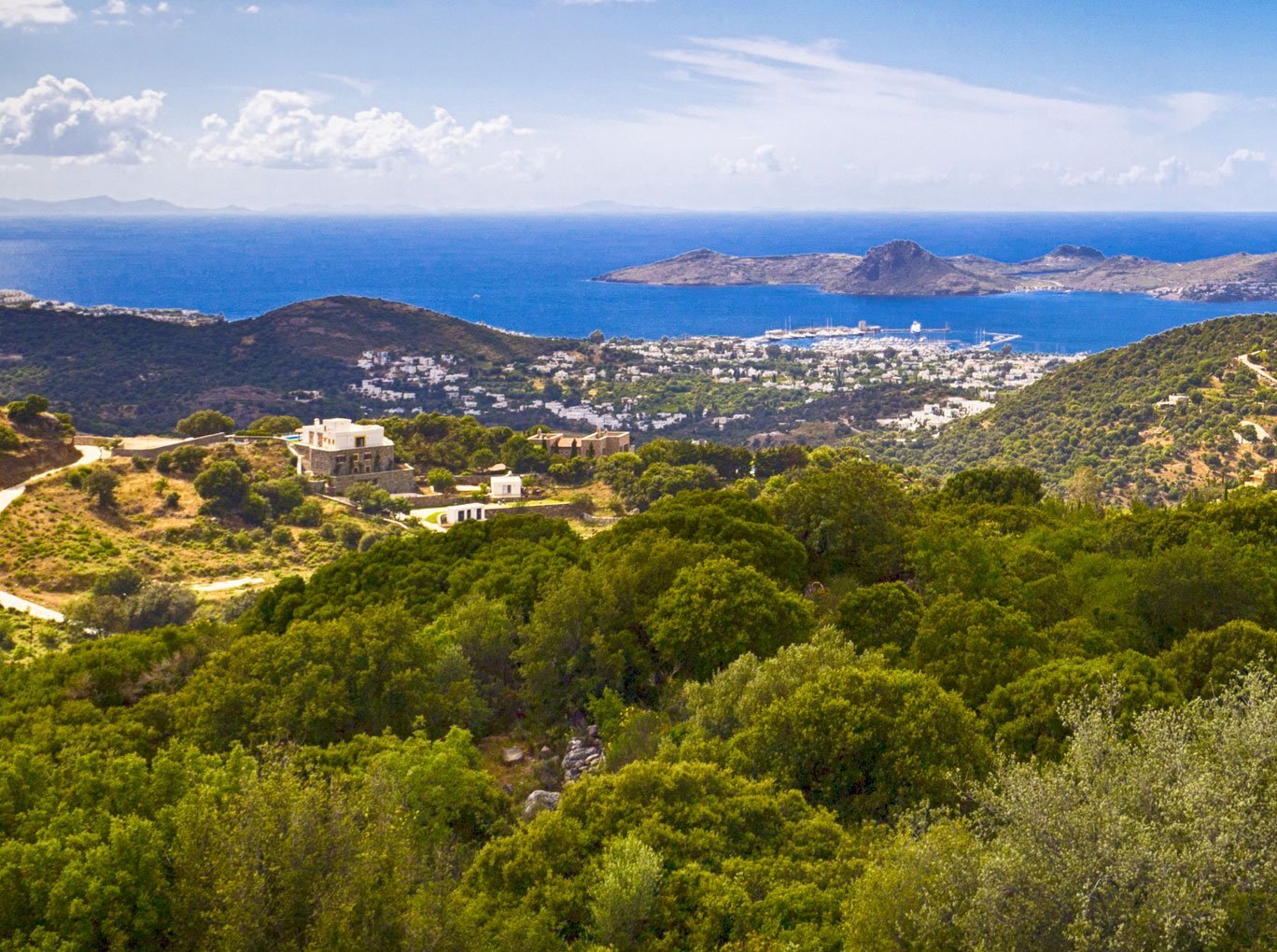Finding the Perfect Property
If you are in the market for a luxury home, find an experienced property consultant who knows the luxury market!
This could be your best chance for finding properties that are for sale but that are not necessarily easy to find because of privacy concerns. An agent familiar with the luxury market will have inside information about listings before they hit the open market. And, an experienced agent will be able to help you determine the market value of a luxury property.
Most residential real estate is valued using comparable similar properties in the area that have recently sold. Valuing luxury properties can be a challenge since often there are no similar properties in the area.
Investment Hotspots
Hot Spot Bodrum
Bodrum Is establishing Itself as a credible luxury location for International Buyers, and is now the hot spot of Turkey, sales of luxury homes have been hitting records.
The number of homes selling for €1 million PLUS have increased massively during 2015 as interest from around the globe increases, especially in the premium residential areas such as Yalikavak (home to the upmarket Yalikavak Marina) which hosts brands such as Cipriani, Versace, Beymen,Nobo, Armani etc plus the luxury hotels such as the Mandarin Oriental the newly open JW Marriot, and Jumeirah. It goes without saying that these brands carry out extensive location research.
The number of Internationally renowned architects now developing prime properties in the area is also grabbing the headlines, last year we completed the sale of the very first Richard Meier villa in Turkey, overlooking Yalikavak’s stunning coastline, the second villa is now available and nearing completion.
International buyers have started to represent a growing percentage of the Luxury real estate market and we mean International! The area is not dominated by one nationality, we see high end buyers from the Gulf, Europe, Scandinavia, Azerbaijan, Kazakhstan, Russia and the Ukraine! Basically Bodrum’s Peninsula has established itself as a credible option for any Luxury home buyer.
Hotspot Istanbul
Istanbul has been on the radar for International property Investors since 2007 when PwC placed this cosmopolitan European city at the top of its investment list. The explosion of new builds due to a massively increasing population via internal migration.
A huge amount of urbanisation has taken place with new suburbs emerging on all sides of the city over the past decade. Whilst it is possible to generate reasonable yields in the new suburbs, it is Luxury Property Turkey’s view that far greater capital appreciation will be achieved in the more established and traditional areas. As the city expands geographically the hub of the city becomes more in demand, and prices respond upwards accordingly.
Investors who are not familiar with the size and scope of the city can often end up investing in areas where there is a concern of oversupply. Our straightforward advice is to first discover what your budget can buy you in the city centre on either side of the Boshporus or fashionable districts which are magnets for second home buyers who wish to escape the hub for a quiet weekend in green lush forests and parks.
Areas to consider
Bahcesehir: The most established of the new suburbs with shopping malls, good infrastructure of new roads and highway and metro links, and also very close to the main airport.
Cengelkoy: In the heart of Istanbul close to the Bosphorous, Kadikoy and Bostanci, on the Asian side with excellent sea transport and full of character of Istanbul life.
Central Istanbul: The hub of Istanbul in the prestigious areas of Nisantasi, Beyoglu, Besiktas, Levent all of which are in high demand and have the capacity of producing excellent rental yields.
Legal Process
Buying property in Turkey? Before parting with any money it is important that some straightforward steps are taken.
- Select an independent lawyer
Select an independent lawyer who is registered with the Turkish Bar Association and ideally with a European Consulate, this will mean that they have been vetted and will have indemnity insurance. It should not be necessary to make a payment to your lawyer until his/her works are completed and the title deed is transferred into your names.
- Check that the Title Deed is in an area where foreign nationals can buy.
All foreign property buyers and sellers in Turkey will need a real estate appraisal report citing the value of the real estate prior to any transaction and title deed handed over. This will cost in the region of €200 and your appointed or licensed real estate broker can handle this process for you.
Before paying a deposit, your Lawyer will check that the Title Deed is in an area where foreign nationals can buy and is not restricted to Turkish nationals.
Presuming this is okay then he/she will check the deed has no debts against it and that importantly it has a certificate of habitation, in Turkish (ISKAN), this is very important as this is the final document to confirm that the property was built in full compliance with the building permit granted. It is not enough to buy a property with just a deed you also need the habitation certificate. You could buy the property without it technically but a good lawyer would advise you against this, in fact a bank would not offer a buyer a mortgage on a property without an ISKAN and, whilst you might be a cash buyer one day, you may want to sell in the future and unless your property has an ISKAN, this will reduce your options and the value of the property.
- Keep the Deposit as low as possible
Once all checks are complete and you and your lawyer are satisfied and you have achieved the price you are happy to pay, then usually a deposit is paid and a purchase agreement drafted. It is obviously sensible to try to keep the deposit as low as possible whilst the process is being followed.
- Not all purchases require an approval by the Authorities
As a foreign national it is necessary to make an application to the authorities to take permission to buy, the authorities will be checking that the property is not in a restricted area and, through our earlier due diligence, we know that the said property is in an area available to foreign nationals. However, the Turkish authorities still need to approve it prior to completion. This process takes approximately 4 to 5 weeks to complete and then the buyer is free to transfer the deed into their names. There is an exception to this rule if on the same plot number, or in the same housing complex, another foreign national has had an application approved after May 2011, then there is no need for an application to be made and the buyer can go ahead straight away.
- Provide your appointed lawyer with a POA (Power of Attorney)
It would be a good idea when in Turkey to go to your local Notary office and give your lawyer your Power of Attorney. This will enable your lawyer to act on your behalf in making the application to the authorities and to transfer the deed in to your name(s) and assist with the connection of utilities etc. The process of issuing the POA in Turkey is very straightforward, to do this individuals must have a tax number (ID number), this can be obtained immediately in the local tax office on presentation of a passport and in the presence of a sworn translator. The Notary can prepare a straightforward POA giving your lawyer certain and restricted rights to act on your behalf. You can also send a POA from overseas but the procedure, time and expense make it worthwhile doing whilst in Turkey.
- Make the payment simultaneously with Deed transfer.
The final part of the process is to transfer ownership. This should be carried out simultaneously with the payment only being made as the deed is transferred in to your name(s). Our preferred method is that clients open their own bank account in Turkey and transfer enough funds for the purchase into their account.
On the day of completion the buyer’s bank drafts a bankers cheque for the amount of the purchase/balance, this cheque is then handed over at the time of legal transfer by either the buyer in person (if they are here for the completion) under the lawyers guidance, or by the lawyer himself using his POA.
- Work with your agent closely
Often a good agent can assist in the process, obviously from finding a suitable property in the first place, but also in terms of negotiating the price and the amount of deposit and highlighting any included items in addition to the property, or any agreed modifications and ensuring a smooth handover.
- Ask questions.. lots of them!
In summary, proceed at your own speed, ask lots of questions and feel satisfied throughout each step.
Purchase Costs
When you make the purchase of a property in Turkey there are a number of costs that you will need to budget for.
Estate Agents Commission
This is generally 2% of your purchase price plus VAT.
Lawyer’s Fee
Generally lawyers fees are charged at 1%
of the purchase price but subject to negotiation depending on the size of the purchase around €1,500 per transaction is the average.
Deeds Transfer Tax
2% of your purchase price for the seller and 2 % of sales price for buyer.
Registration Fee
€70 this is a fee charged for each transaction at the land registry office.
Translation Services
Your passport will require translation €100.
Earthquake Insurance
DASK is the annual compulsory earthquake insurance and is approximately €70.
Value Added Tax
This is charged at 18% on the sale of a new residential building over 150m² if the seller is a construction company
Government Tax
This covers administration costs to the government for military checks. You should budget for approximately €150200
Appraisal report €200
Turkish Real Estate Taxes
Turkish real estate taxes (payable by all irrespective of residency) are very low when compared to other European countries, and Turkey should be at the top of your list with its low property and income taxes, high property value growth rates and minimal barriers to foreign property ownership. If you are considering purchasing property investments in Turkey, you’ll want to understand how taxes are levied in Turkey.
Taxes on real estate in Turkey can be divided into three clear sectors.
1. Stamp Duty
Stamp Duty is a tax paid when ownership changes hands. This tax is 4% of the declared sales price and is known as a ‘buyers and sellers’ tax. It should be shared equally with both the buyer and seller paying 2% ach. However, we must underline stamp duty is usually part of the purchase negotiations and sellers tend to try and push the entire liability over to the buyers especially if it is a developer selling a new build. An effective agent should do their best to insist on the equal sharing of the liability.
2. Annual Property Tax
The authorities have a unique way of calculating annual property tax that takes in to account the size of the property, the cost of the land and build, and the neighborhood, it is very easy for your Lawyer to confirm what the tax will be during his due diligence checks before you agree to purchase, rates are extremely low. For example, a villa with a value of less than 5,000,000TL tax would typically be around €450 per annum.
3. Capital Gains Tax
Turkey will also tax income from real estate, including income (profit) that a foreign real estate investor gains from the sale of real estate and from renting out his/her property in Turkey. Tax rates range from 15% to 30%.
As of the time of this guide publication Turkey does not offer elimination of the income tax if the income is reinvested into another property.
Taxes on income relevant to real estate, which are payable by residents as well as nonresidents, therefore fall into 2 main categories as follows
a. Capital gains tax on the profit made upon sale of property
b. Capital gains tax applies when an asset such as a property is sold.
In Turkey the profit is taxed in line with income tax, and it’s important to note that if the property has been owned for five years or more any profit of any amount is exempt of any tax.
If however you have owned the property for less than five years then you will be eligible for capital gains tax. This is purely calculated between the difference of the amount declared and displayed on the title deed when you took purchased and the amount displayed on the deed at the time of the sale.
The amount of tax you will pay as a capital gains tax depends on the amount of profit you have made the scale is between 15% and 35%
For profit of up to 12,600TL the rate is 15% from 12,601 to 30,000TL 20% from 30,001TL to 69,000 27% and anything above 69,001TL 35%
For careful tax planning, please note that capital gains tax drops to zero (nothing payable) after 5 years of ownership. This is to say if you have owned your property in Turkey for more than 5 years, then there is no capital gains tax payable at all.
Buying Land, and Building a Property
If you are considering buying land and build your own villa Luxury Property Turkey suggest you follow the steps.
1. Absolute first thing as always engage a capable Law firm.
2. Check what type of land classification you can buy
Your estate agent and consultant will be able to guide you in terms of what classification of land you will be able to buy as a foreign national.
3. Check you have enough buildable area
Once you have found the plot of land that ticks your boxes in terms of location, outlook and of course price then you need to consider if the size of the plot coupled with the zoning gives you enough buildable area, the following table demonstrates the various percentages.
Farming Land Zoning:
3% and 5% are given to farming land where Turkish nationals can build one property on a land plot of a minimum of 5,000m2.
This means a property can be built of 35% on a plot of 5,000m2 for Turkish nationals so at 5% it would be 250m2.
Foreign nationals are allowed to purchase land and build with such a classification if the plot is at least 10,000m2. Therefore, for example, a foreign national can buy farming land plot of 10,000m2 and build a 500m2 property if the permission was 5%.
Two Level Zoning:
102O (This means 10% of the plot as a footprint and 10% as a first floor so in total 20% of the plot, so if the plot was 1,000m2 a 200m2 villa could be constructed) the following follow the same format!
7.515
1530
2040
The maximum number of floors for a property on the Bodrum Peninsula is now two storey’s, although an innovative architect may be able to design a basement into a suitable slope if it is not visible from the roadside.
Single Level Zoning:
The following format which is a lot more rare the stipulation is for single storey buildings.
020 ( This means simply in total a single storey villa can built of up to 20% of the land, so again a 200m2 property on a 1,000m2 plot) the following again follow the same format
015
030
040
Take note. If you have found your land and your lawyer has confirmed the zoning, if none of the above exist then the land would not be eligible for a foreign national to purchase.
4. Engage a cartographic engineer
The next steps are essential before you part with any money, engage a cartographic engineer. Your agent or lawyer should be able to assist in organizing this. The engineer will check the boundaries and mark them and he will confirm whether the plot you are considering to purchase is NET or GROSS.
5. Double check for any Easement
Easement is where the authorities NET down the land to take into account things like access for neigbouring plots. It is very important that road access is checked and properly understood especially in underdeveloped areas to avoid any surprise problems later on, For example, you have found a plot of land of 1,000m2 and behind there is another 1,000m2 private plot but there is no direct road access, when you apply for planning the authorities might say we need to take off you 200m2 to give road access to the other plot. Then your land nets down to 800m2, and this land is GROSS 1000m2 and NET 800m2
If the easement has not been done it will be necessary to change the status of the Title Deed to a building plot.
6. Check if the land has historic status which will affect building
Checks also need to be made to see if the plot is classified as ‘precious’, as it could have some historic importance.
There are three degrees of precious status:
• If the land is classified as 1st degree it cannot be touched the most you could do is picnic on it.
• If the land has 2nd degree status it may be possible to build but only with tight legislation and restrictions
• Finally, if the plot is 3rd degree anything is possible but an application needs to be approved by a committee at the regional municipality headquarters.
7. Carry out a final due diligence check with an independent surveyor Once you are satisfied that you have the right plot at the right price and all of the legal due diligence has been provided it is worth one final check. A good lawyer and agent would support this approach. Appoint an independent surveyor
or company who do valuations for banks. They will carry out a detailed search and provide a file on the land the boundaries, the area and the neighbourhood, and provide a valuation of the land. It is worth noting that banks always encourage conservative estimations with usually come out at least 20% below market value.
8. Carry out the Land Purchase
The method of purchase is exactly the same as buying an existing property. The land should not be in a restricted area, for further details check our 8 Tips to the Legal Process for Buying Property in Turkey. It is also worth noting that banks will not loan to foreign nationals for the purchase of land. However. if you can self finance the land and build, then when the building is complete you could then apply for a mortgage to take back some equity.
9. Obtain a building permit
Once you have the land and Title deed in to your name(s), before building you will need to obtain a building permit. An application will need to be submitted including architectural drawings, statistical engineer and electrical engineer plans. These can all be coordinated by the appointed architect. Once the building permit has been granted it is valid for 5 years giving you this length of time to commence the works. In most tourist resorts throughout Turkey there is a seasonal ban on construction the building season is from the 15th of October until the 15th of May.
10. Appoint a legally certified building firm
At Luxury Property Turkey, we have assisted a good number of foreign nationals in terms of sourcing land and introducing credible professional partners following all of the tips and advice above,such as introducing a selection of lawyers and architects and registered building firms,.
It is now necessary to appoint a legally certified building firm in Turkey. Only authorized Companies are allowed to build they will deal with the government inspectors who check each vital stage of the construction and issue stamped certificates that combined together at the end of the project are submitted to achieve the final and all important ‘habitation certificate’.
Luxury Property Turkey have a good track record of acting as a link between the individual client and the relevant professionals and tradesman from start to finish, so if your dream is to buy land and build your own villa, take your time, move at your own speed, and let us demonstrate some completed projects and speak first hand to clients who have lived through the experience.







